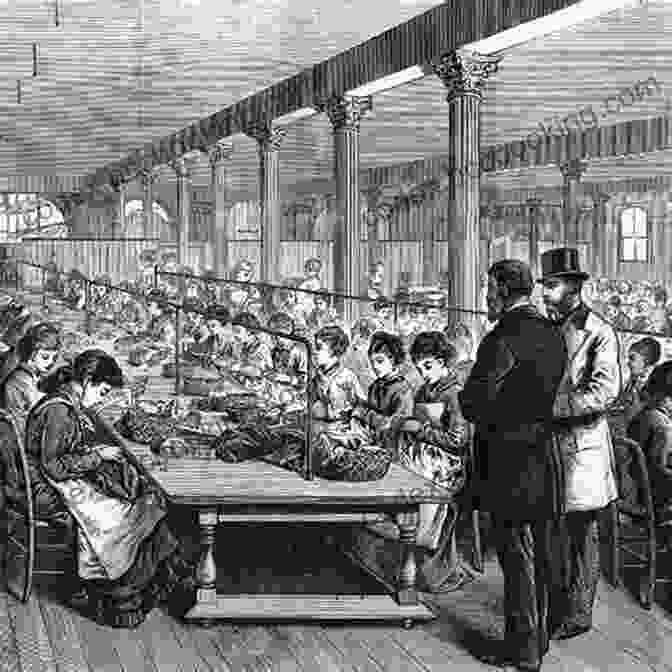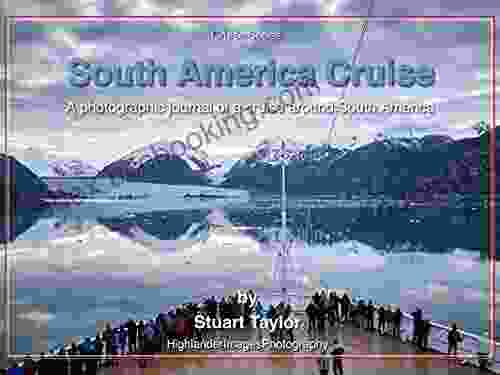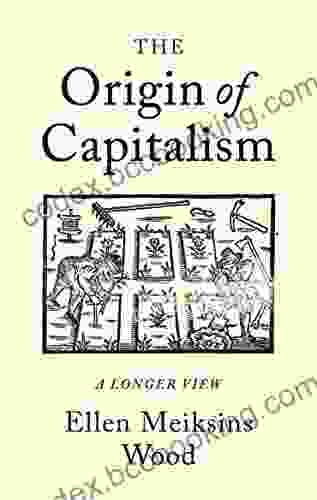Unveiling the Origin of Capitalism: A Comprehensive Exploration through Time


The Dawn of Commerce: Ancient Roots
Capitalism, a dynamic economic system characterized by private ownership, profit-seeking, and free markets, has a rich and multifaceted history spanning centuries. Its origins can be traced back to the vibrant ancient civilizations that fostered trade and commerce.
4.5 out of 5
| Language | : | English |
| File size | : | 606 KB |
| Text-to-Speech | : | Enabled |
| Screen Reader | : | Supported |
| Enhanced typesetting | : | Enabled |
| X-Ray | : | Enabled |
| Word Wise | : | Enabled |
| Print length | : | 206 pages |
In Mesopotamia, around 3500 BC, the Sumerians established one of the earliest known organized markets, where goods and services were exchanged using standardized weights and measures. Babylon, another Mesopotamian city-state, later developed a sophisticated banking system, facilitating loan transactions and investment activities.
Egypt, under the Pharaohs, witnessed the emergence of a centralized economy where state-controlled monopolies dominated trade in essential commodities. The Phoenicians, renowned seafaring traders, established colonies throughout the Mediterranean, spreading commercial practices and fostering economic exchange.
Classical Greece and Roman Empire: Economic Evolution
Ancient Greece witnessed significant advancements in economic thought, with philosophers such as Aristotle pondering the nature of wealth and market exchange. The city-state of Athens embraced a free-market economy, allowing individuals to pursue their economic interests.
The Roman Empire, spanning from the 1st century BC to the 5th century AD, further developed trade networks and commercial institutions. Roman roads facilitated the transportation of goods, enabling long-distance trade and the exchange of ideas and technologies.
Medieval Europe: Guilds, Commerce, and the Renaissance
During the Middle Ages, Europe saw the rise of guilds, associations of artisans and merchants that regulated trade and production. Guilds played a vital role in maintaining quality standards, fostering innovation, and facilitating economic growth in urban centers.
The 12th century witnessed the emergence of merchant capitalism, as enterprising individuals and families amassed wealth through trade, banking, and investments. The Italian city-states of Venice, Genoa, and Florence became hubs of international commerce, driven by maritime trade and financial innovations.
The Renaissance, from the 14th to the 17th century, brought about a renewed interest in classical learning, including economic thought. Humanist scholars re-examined the works of ancient philosophers and advocated for individual freedom and economic opportunity.
Mercantilism and Global Trade: The Early Modern Era
The 16th century marked the dawn of mercantilism, an economic policy that emphasized the accumulation of wealth and power through state-controlled trade and industry. European nations established colonies in distant lands, seeking access to raw materials, new markets, and labor forces.
The Age of Exploration, from the 15th to the 17th century, witnessed the expansion of global trade networks, as European powers established trading posts and colonies around the world. The discovery of the Americas, Africa, and Asia brought an influx of new goods, resources, and ideas, transforming economic landscapes.
Classical Capitalism: Adam Smith and the Industrial Revolution
The 18th century was a pivotal period in the development of capitalism. Adam Smith's groundbreaking work, "The Wealth of Nations," published in 1776, laid the intellectual foundation for classical capitalism. Smith argued that the pursuit of self-interest, guided by the "invisible hand" of the market, would lead to economic growth and prosperity.
The Industrial Revolution, which began in Great Britain in the late 18th century, accelerated economic transformation. Technological advancements, such as the steam engine and the power loom, led to increased productivity, mass production, and the emergence of factories and urban industrial centers.
Capitalism in the 19th and 20th Centuries: Globalization and Industrialization
The 19th and 20th centuries witnessed the continued expansion of capitalism on a global scale. Industrialization spread to other European countries and North America, leading to economic growth and technological progress.
The development of transportation and communication technologies, such as railways, steamships, and the telegraph, facilitated the globalization of trade and investment. The rise of multinational corporations and the expansion of international banking systems further integrated the world economy.
Modern Capitalism: Challenges and Evolution
In the 21st century, capitalism continues to evolve and adapt to changing circumstances. The rise of digital technologies and the internet has led to the emergence of new industries, business models, and economic challenges.
Contemporary capitalism faces debates and discussions regarding income inequality, environmental sustainability, and the role of government regulation in safeguarding economic stability and social welfare. As the world navigates these complexities, the enduring legacy of capitalism remains a topic of ongoing inquiry and analysis.
: A Continuing Legacy
The history of capitalism is a captivating tapestry woven over centuries, shaped by diverse civilizations, economic theories, and technological advancements. From its humble beginnings in ancient markets to its complex manifestations in the modern world, capitalism has played a profound role in shaping human societies and economies.
This comprehensive exploration of the origin and evolution of capitalism provides a deeper understanding of its enduring impact on our world. As we continue to grapple with the challenges and opportunities of the 21st century, the study of capitalism remains essential for shaping informed perspectives on the economic systems that govern our lives.
4.5 out of 5
| Language | : | English |
| File size | : | 606 KB |
| Text-to-Speech | : | Enabled |
| Screen Reader | : | Supported |
| Enhanced typesetting | : | Enabled |
| X-Ray | : | Enabled |
| Word Wise | : | Enabled |
| Print length | : | 206 pages |
Do you want to contribute by writing guest posts on this blog?
Please contact us and send us a resume of previous articles that you have written.
 Book
Book Novel
Novel Page
Page Chapter
Chapter Text
Text Story
Story Genre
Genre Reader
Reader Library
Library Paperback
Paperback E-book
E-book Magazine
Magazine Newspaper
Newspaper Paragraph
Paragraph Sentence
Sentence Bookmark
Bookmark Shelf
Shelf Glossary
Glossary Bibliography
Bibliography Foreword
Foreword Preface
Preface Synopsis
Synopsis Annotation
Annotation Footnote
Footnote Manuscript
Manuscript Scroll
Scroll Codex
Codex Tome
Tome Bestseller
Bestseller Classics
Classics Library card
Library card Narrative
Narrative Biography
Biography Autobiography
Autobiography Memoir
Memoir Reference
Reference Encyclopedia
Encyclopedia Jeremy Gordin
Jeremy Gordin Ellen K Cromley
Ellen K Cromley Lorne Lantz
Lorne Lantz Eric Bodnar
Eric Bodnar Witold J Henisz
Witold J Henisz Emiliano Zapata
Emiliano Zapata Elliot Aronson
Elliot Aronson Epm Mavericks
Epm Mavericks Enthralling History
Enthralling History Elton Moraes
Elton Moraes Jen Goodman
Jen Goodman Marco Leonel Garcia Gonzalez
Marco Leonel Garcia Gonzalez Elwyn Hartley Edwards
Elwyn Hartley Edwards Robert J Bonk
Robert J Bonk Marlo Schalesky
Marlo Schalesky Emily Sturgill
Emily Sturgill George Lavrov
George Lavrov Emanuela Todeva
Emanuela Todeva Vanessa Goertzen
Vanessa Goertzen Shaul Kelner
Shaul Kelner
Light bulbAdvertise smarter! Our strategic ad space ensures maximum exposure. Reserve your spot today!

 George R.R. MartinUnlock Financial Freedom: A Comprehensive Guide to Prepare for Your Golden...
George R.R. MartinUnlock Financial Freedom: A Comprehensive Guide to Prepare for Your Golden... Oscar BellFollow ·6.5k
Oscar BellFollow ·6.5k Henry David ThoreauFollow ·10.6k
Henry David ThoreauFollow ·10.6k Dave SimmonsFollow ·5.3k
Dave SimmonsFollow ·5.3k Henry Wadsworth LongfellowFollow ·15.6k
Henry Wadsworth LongfellowFollow ·15.6k Pablo NerudaFollow ·13.9k
Pablo NerudaFollow ·13.9k Will WardFollow ·10.1k
Will WardFollow ·10.1k Guy PowellFollow ·5.5k
Guy PowellFollow ·5.5k Melvin BlairFollow ·15.3k
Melvin BlairFollow ·15.3k

 Isaias Blair
Isaias BlairEscape to Sunrise Cottage: A Captivating Read You Won't...
Are you ready for a...

 Bradley Dixon
Bradley DixonWhen Baby Is Born, So Is Mother: A Comprehensive Guide to...
Giving birth is a...

 Mario Simmons
Mario SimmonsPhotographic Journal of Cruise Around South America: A...
Embark on an Extraordinary Expedition ...

 Langston Hughes
Langston HughesDream Achieved: Unlocking the Power Within to Make Your...
In the tapestry...
4.5 out of 5
| Language | : | English |
| File size | : | 606 KB |
| Text-to-Speech | : | Enabled |
| Screen Reader | : | Supported |
| Enhanced typesetting | : | Enabled |
| X-Ray | : | Enabled |
| Word Wise | : | Enabled |
| Print length | : | 206 pages |












